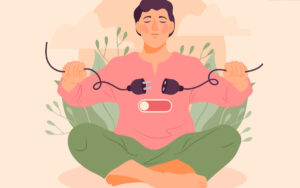Irritability is something we all experience at different times, but for some, it can be a constant, frustrating presence.
You might snap at small inconveniences, feel on edge for no clear reason, or notice that stressors that once seemed minor now trigger intense frustration.
If you’ve ever wondered why irritability has such a strong grip on your mood and what you can do about it, the answers may lie in the fascinating interaction between inflammation, gut health, and neurotransmitters in your brain.
In this article, we’ll explore why irritability happens and, most importantly, provide you with practical solutions that can help calm those feelings.
Key Points of the Article:
- Inflammation and Mood: Discover how chronic inflammation can alter your brain chemistry, making you more prone to irritability.
- The Gut-Brain Connection: Learn why the bacteria in your gut might be influencing your mood and how improving gut health can help.
- Neurotransmitter Imbalances: Understand how imbalances in brain chemicals like serotonin and dopamine can impact emotional regulation and irritability.
- Holistic Solutions: We’ll provide you with actionable steps—from dietary changes to mindfulness practices—to help manage and reduce irritability.
Understanding Irritability: What’s Happening in Your Body
We often think of irritability as just a passing feeling or a response to stress, but it’s much more complex than that. It involves your brain, immune system, and even your gut. Let’s break this down:
1. Inflammation: A Hidden Contributor to Irritability
When we hear “inflammation,” we usually think of physical injuries or illnesses. But did you know that chronic, low-level inflammation can also affect your brain? This type of inflammation has been linked to mood disorders like anxiety, depression, and—you guessed it—irritability.
When your body is in a state of chronic inflammation (often caused by factors like poor diet, stress, or lack of sleep), it releases chemicals called cytokines. These cytokines can disrupt the brain’s normal functioning and lead to irritability and mood swings. In simple terms, your body is telling your brain that something is wrong, making you more likely to feel irritated or agitated.
Solution: Anti-inflammatory Diet and Lifestyle
Reducing inflammation is key to calming irritability, as chronic inflammation has been linked to mood disorders like anxiety, depression, and irritability. To tackle this, it’s essential to make thoughtful dietary and lifestyle changes that lower inflammation in the body.
Here’s how to get started:
Incorporate Anti-Inflammatory Foods:
- Leafy greens (like spinach, kale, and arugula) are rich in antioxidants and vitamins that help fight inflammation.
- Fatty fish (such as salmon, mackerel, and sardines) provide omega-3 fatty acids, which have been shown to lower inflammation and support brain health.
- Turmeric contains curcumin, a compound that has strong anti-inflammatory effects. Adding turmeric to your meals or drinking turmeric tea regularly can help manage mood.
- Other anti-inflammatory foods include berries, nuts, and olive oil.
Actionable tip: Start by adding a handful of spinach to your morning smoothie or replacing regular snacks with a handful of nuts. Drizzle olive oil over salads or roasted vegetables, and aim to eat fish two to three times per week.
Engage in Regular Exercise: Physical activity helps reduce inflammation and balances stress hormones like cortisol, which play a role in irritability. Exercise also promotes the release of endorphins, the body’s natural “feel-good” chemicals that improve mood.
Actionable tip: You don’t have to hit the gym every day—just 30 minutes of moderate activity, like walking, cycling, or yoga, can make a huge difference. Start small and gradually increase your activity to build consistency.
Prioritize Sleep: Sleep is crucial for allowing your body to recover and reduce inflammation. Chronic lack of sleep is linked to increased levels of inflammatory markers, which can worsen irritability and mood swings.
Actionable tip: Develop a bedtime routine that helps signal to your body that it’s time to wind down. Turn off screens at least an hour before bed, practice breathing exercises, or try essential oils like lavender for relaxation.
By making these changes, you can reduce inflammation, support overall well-being, and ease irritability in a sustainable way.
2. The Gut-Brain Connection: How Your Microbiome Impacts Mood
If you’ve ever had “gut feelings,” there’s science behind that. The gut and brain are closely linked through what’s known as the gut-brain axis, a communication network that connects your gut microbiome to your brain. If the bacteria in your gut are out of balance (a condition called dysbiosis), it can directly affect your mood and contribute to feelings of irritability.
Studies have shown that gut health influences the production of serotonin, a neurotransmitter that regulates mood. Since 90% of serotonin is produced in the gut, poor gut health can significantly impact your ability to stay calm and composed.
Solution: Improve Gut Health with Probiotics and Fiber Incorporating probiotic-rich foods like yogurt, kefir, or sauerkraut, and eating a diet high in fiber, can help support a healthy gut microbiome. When your gut is in balance, you’re less likely to experience those overwhelming feelings of irritability.

3. Neurotransmitter Imbalances: The Chemistry Behind Your Mood
At the root of many mood disorders, including irritability, is an imbalance in neurotransmitters—specifically serotonin, dopamine, and GABA. These brain chemicals regulate how we feel on a daily basis. Serotonin helps regulate mood and feelings of well-being, while dopamine is tied to reward and motivation. GABA is a calming neurotransmitter that helps soothe an overstimulated brain.
When these neurotransmitters are out of balance, whether due to stress, poor nutrition, or genetic factors, you may experience heightened irritability and difficulty managing emotions.
Solution: Target Neurotransmitters with Mindfulness and Nutrition
Neurotransmitters, like serotonin and dopamine, play a crucial role in regulating mood, helping you stay calm, and controlling emotional responses. When neurotransmitter production is disrupted, it can lead to heightened irritability and mood swings. Thankfully, there are ways to naturally boost these brain chemicals to feel more balanced and in control.
Mindfulness Practices
Mindfulness and meditation aren’t just trendy buzzwords—they are scientifically proven tools that help regulate neurotransmitter production. For example, mindfulness meditation has been shown to increase serotonin levels, a neurotransmitter that contributes to feelings of well-being and happiness. It also reduces the body’s stress response, helping keep irritability in check.
How it works: Meditation slows down your mind, reduces stress hormones like cortisol, and encourages serotonin release. This combination improves your emotional resilience, making it easier to navigate stressful situations without feeling overwhelmed or irritable.
Actionable tip: Start with just 5–10 minutes of deep breathing or guided meditation daily. Focus on slow, deep breaths, and let go of tension in your body. Try using apps like Calm or Headspace to guide you through the process.
Nutrition to Boost Serotonin
What you eat can have a direct impact on your mood because certain foods help increase serotonin production. Serotonin is created from tryptophan, an amino acid found in foods like turkey, eggs, nuts, seeds, and bananas. By incorporating these foods into your diet, you provide your body with the building blocks it needs to maintain stable serotonin levels.
Actionable tip: For a natural mood boost, try adding more tryptophan-rich foods to your daily meals. For example, have scrambled eggs for breakfast, a turkey salad for lunch, or a handful of nuts as a snack. Bananas make for a great serotonin-boosting addition to smoothies or as a standalone snack when you’re feeling stressed.
Combining Mindfulness and Nutrition for Maximum Impact
Pairing mindful practices with nutritional support can have a synergistic effect on neurotransmitter regulation. By reducing stress through meditation and ensuring your body has the right nutrients, you can create an environment where your brain can thrive, promoting calmness and reducing irritability.
Actionable tip: After completing your mindfulness practice, enjoy a calming cup of chamomile tea (known for its anti-anxiety properties) alongside a snack like yogurt with chia seeds and bananas. This simple routine not only boosts serotonin but also helps signal to your body that it’s time to relax and recharge.

4. Solution: A Healing Mineral Bath to Soothe Irritability
In addition to mindful breathing and mindfulness-based practices, a well-deserved bath ritual can be an excellent way to release pent-up irritability and soothe both body and mind. By using mineral-rich salts and essential oils, you can create a space that allows you to unwind, let go of stress, and reconnect with your emotions.
Taking time for yourself with a carefully crafted bath doesn’t just ease physical tension but can significantly enhance your emotional well-being. This is why a holistic approach—engaging both body and mind—can be particularly powerful for managing irritability.
Mineral Clay Bath Recipe for Emotional Balance
This recipe combines Epsom salts, green clay, and a synergy of essential oils to promote deep relaxation, mood elevation, and emotional balance. The benefits of each ingredient are maximized to help you detoxify and calm your mind.
Ingredients:
- 200g of Epsom salts (for muscle relaxation and reducing inflammation)
- 100g of green clay (to detoxify the skin and balance your body)
- 5 drops of lavender essential oil (to soothe the mind and promote relaxation)
- 5 drops of eucalyptus essential oil (to refresh and stimulate clarity)
- 5 drops of geranium essential oil (to stabilize mood and uplift spirits)
Instructions:
- Mix the Epsom salts and green clay in a bowl, then gently add the essential oils: lavender for relaxation, eucalyptus to clear the mind, and geranium for emotional balance.
- Pour the mixture into a warm bath, ensuring that all the ingredients dissolve completely.
- Soak for 20-30 minutes, focusing on slow, deep breathing while your body detoxifies and relaxes.
Why it Works:
- Epsom salts are packed with magnesium, which calms the nervous system and reduces tension.
- Green clay detoxifies and refreshes the skin, while the essential oils provide mood-boosting properties.
- Lavender offers tranquility and stress relief, eucalyptus clears the mind, and geranium restores emotional balance.
Incorporating a bath like this into your routine once or twice a week can help release tension and improve your emotional well-being, ensuring you feel more at ease and less irritable. Try coupling this ritual with other calming techniques, such as mindful breathing or meditation, for an enhanced sense of peace
Take Control of Your Irritability
Irritability can feel overwhelming, but it’s important to know that it’s not your fault. Factors like inflammation, gut health, and neurotransmitter imbalances all play a role, but they’re also manageable. By making small, thoughtful changes in your diet, lifestyle, and self-care practices, you can take meaningful steps to reduce irritability and improve your overall mental and physical well-being.
Take this as a reminder that your body and mind are interconnected. With the right tools and knowledge, you have the power to create balance and calm in your life.



































